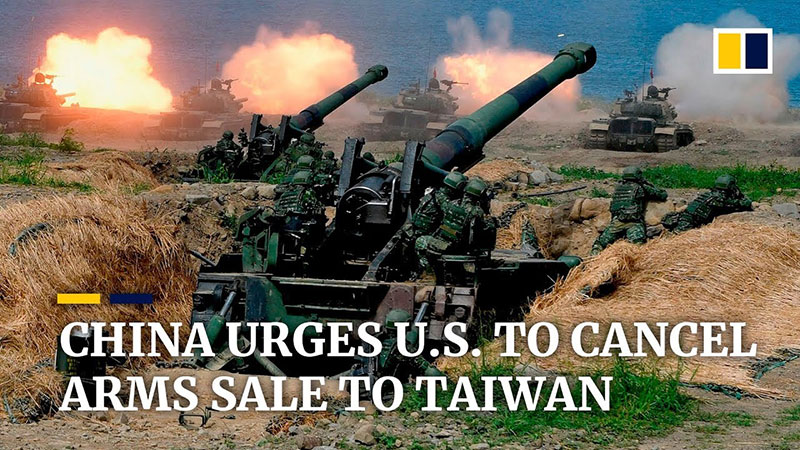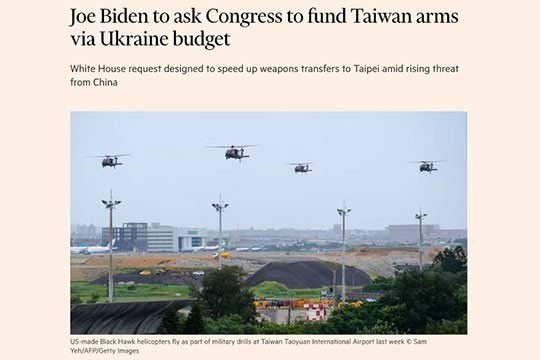The White House will ask Congress to fund arms for Taiwan as part of a supplemental budget request for Ukraine, in an effort to speed up the supply of weapons to the country amid the rising threat from China, informs The Financial Times. The Office of Management and Budget will include funding for Taiwan in the supplemental request as part of an effort to accelerate the provision of weapons, according to two people familiar with the plan.
Biden announced a $345 million military aid package for Taiwan. According to the press: portable anti-aircraft missile systems, firearms, missiles, reconnaissance and surveillance equipment.
If passed by Congress, Taiwan would get arms through a US taxpayer-funded system known as “foreign military financing” for the first time. The White House is expected to submit the request this month.
America has long believed that helping Ukraine was not only essential to preserving the security of Europe, but also important to deterring China from invading Taiwan. On July 28th it took that reasoning a leap forward by announcing it would for the first time start to arm Taiwan from America’s own military stocks, as it has done repeatedly for Ukraine. The main difference is that it has not invoked an “emergency” to justify the move. Instead, it believes the arms supplies will help forestall a war across the Taiwan Strait, comments London ‘The Economist’.
The military move may instead provoke a new crisis. China will not accept American claims that it is nothing out of the ordinary, and represents “no change” in America’s Taiwan policy. After all, America is shifting from selling weapons to Taiwan to subsidising its armed forces. Even before the announcement, a Chinese defence-ministry spokesman denounced arms supplies to Taiwan as “malicious acts”, saying they posed “a serious threat to peace and stability in the Taiwan Strait, and created significant strategic risks in China-us military relations”.
The White House offered few details of the arms, worth $345m, to be supplied through the fast-track “presidential drawdown authority” (PDA). It said only that it would provide “defence articles and services” as well as “military education and training”. A Pentagon spokesman said the package would include unspecified anti-armour and anti-aircraft weapons, as well as “multi-domain awareness” (mq-9A surveillance drones, according to leaks). More such military aid may soon follow, given that Lloyd Austin, the defence secretary, has said he intends to use the full $1bn authorised by Congress before the current fiscal year ends on September 30th.
The attempt to play down the move — by burying the announcement in legalese and issuing it late on a Friday, classically a means of burying awkward news — betrays a certain trepidation in the administration of President Joe Biden.
The Biden administration has hitherto claimed it could “walk and chew gum” at the same time: that is, help push back Russia’s onslaught while deterring China. Even as it has rallied European allies to help Ukraine defend itself, the administration has been weaving a variety of mini-alliances in the Indo-Pacific to constrain China.
In contrast with the PDAs for Ukraine, Congress has not appropriated funds needed to replenish weapons being given to Taiwan. In the short term the Pentagon can probably re-allocate funds internally, say congressional staffers. But for the new Taiwan policy to be sustainable, Congress will have to appropriate money in the next fiscal year.
That, in turn, will depend on the tortuous budgeting process in a divided Congress, especially the House, where “America First” admirers of Donald Trump, who are sceptical if not hostile towards Ukraine, hold greater sway, writes ‘The Economist’.

Ministry of Foreign Affairs, the People's Republic of China comments this news: “The supply of US arms to the Taiwan region of China seriously violates the one-China principle and the provisions of the three joint China-US communiqués, especially the August 17 communiqué, seriously harms China's sovereignty and security interests, and seriously undermines China-US relations and peace and stability across the Taiwan Strait. China is strongly dissatisfied with this and vehemently opposed to it, and has made strong submissions to the US.
“The Taiwan issue is the core of China's core interests and the first insurmountable red line in Sino-US relations. We call on the American side to strictly abide by the One China principle and the provisions of the three Sino-US joint communiqués, stop strengthening US-Taiwan military ties and arming Taiwan under any name and by any means, stop creating tension in the Taiwan Strait, and stop pandering to and supporting separatist forces for ‘independence of Taiwan’ and to ‘achieve independence by force’. No one should underestimate the strong determination, firm will and strong ability of the Chinese people to defend national sovereignty and territorial integrity.”
…The question is: whether the decision symbolizes the beginning of a US withdrawal from Ukraine? Does this decision mean that the US is going to abandon Ukraine and move the center of its policy from Europe to the Pacific? May be, we are seeing some strategic U-turn in Biden’s politics. The forthcoming meeting in Jeddah on August 5-6 will show – how events can develop. Some commentators believe that in Saudi Arabia they will raise the issue of a certain “peace treaty” with Russia and Western withdrawal from Ukraine.
read more in our Telegram-channel https://t.me/The_International_Affairs

 11:48 03.08.2023 •
11:48 03.08.2023 •























